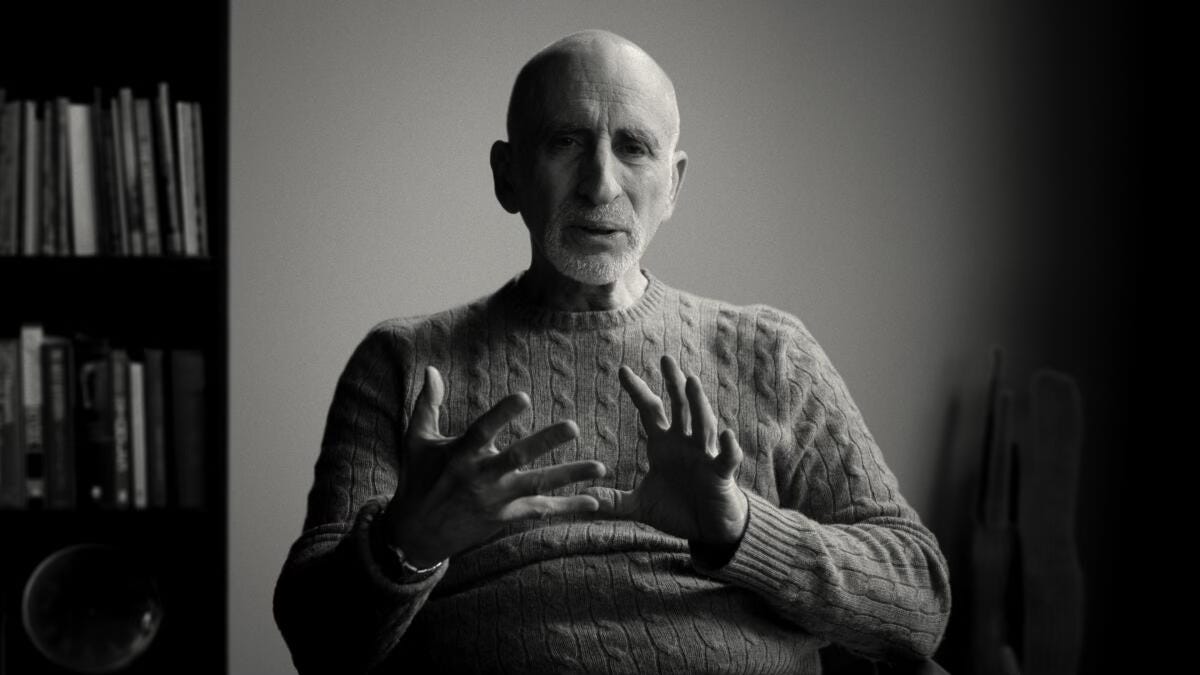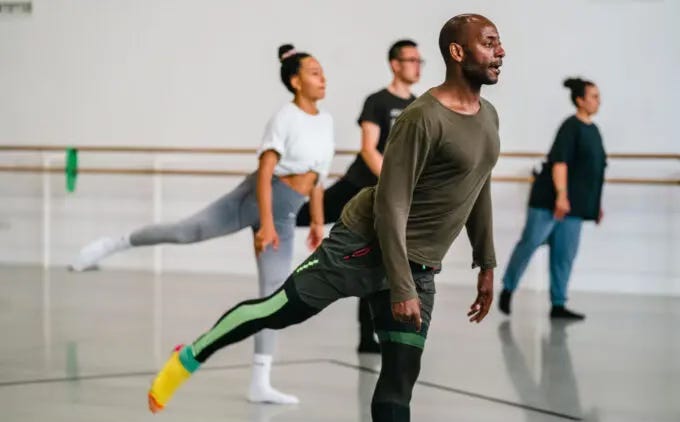#2. Shadow work, writing and drop-ins
Including writers' workshops, grants, programmes and residencies, plus drop-in events across visual arts, pottery, acting, dance and music.
INSPIRATION
We’re getting philosophical this week with a foray into shadow work and its potential for boosting your creativity. If that’s a bit much for you on a Monday morning, I’ve thrown in yet another excuse for you to visit Margate.
Shadow work for creativity
Since watching Jonah Hill’s documentary on his psychiatrist Phil Stutz and his approach to therapy, I’ve been curious to learn more about the psychological concept of ‘the shadow’. According to its originator Carl Jung, the shadow is the unconscious part of your mind that contains repressed negative emotions and impulses.
Put simply by Stutz, it’s “Everything you don’t wish to be, but fear that you are.” On hearing that concept, I had an instinctive sense of the shape of my own shadow - and an awareness that I’d been hiding aspects of it for much of my life.
But Stutz, like Jung, argues that, “When we reveal the shadow, when we give in to its imperfections, its nature changes. It becomes a source of creativity and confidence.” As someone whose sense of self is tied closely to my ability to create, I wanted to learn more about these ideas - and how to harness my shadow for good.
This fun little rabbithole pointed me towards a collection of essays - Meeting the shadow: the hidden power of the dark side of human nature.* I’ve shared one of the book’s first entries below, as I think it offers a nice introduction to the concept.
The long bag we drag behind us
By Robert Bly
When we were one or two years old we had what we might visualize as a 360-degree personality. Energy radiated out from all parts of our body and all parts of our psyche. A child running is a living globe of energy. We had a ball of energy, all right; but one day we noticed that our parents didn’t like certain parts of that ball. They said things like “Can’t you be still?” Or “It isn’t nice to try and kill your brother.”
Behind us we have an invisible bag, and the part of us our parents don’t like, we, to keep our parents’ love, put in the bag. By the time we go to school our bag is quite large. Then our teachers have their say: “Good children don’t get angry over such little things.” So we take our anger and put it in the bag. By the time my brother and I were twelve in Madison, Minnesota, we were known as “the nice Bly boys.” Our bags were already a mile long.
Then we do a lot of bag-stuffing in high school. This time it’s no longer the evil grown-ups that pressure us, but people our own age. I lied all through high school automatically to try to be more like the basketball players. Any part of myself that was a little slow went into the bag.
Out of a round globe of energy the twenty-year-old ends up with a slice. We’ll imagine a man who has a thin slice left — the rest is in the bag — and we’ll imagine that he meets a woman; let’s say they are both twenty-four. She has a thin, elegant slice left. They join each other in a ceremony, and this union of two slices is called marriage. Even together the two do not make up one person!
We spend our life until we’re twenty deciding what parts of ourself to put into the bag, and we spend the rest of our lives trying to get them out again. Sometimes retrieving them feels impossible, as if the bag were sealed. Suppose the bag remains sealed — what happens then?
A great nineteenth-century story has an idea about that. One night Robert Louis Stevenson woke up and told his wife a bit of a dream he’d just had. She urged him to write it down; he did, and it became Dr. Jekyll and Mr. Hyde. The nice side of the personality becomes, in our idealistic culture, nicer and nicer. The Western man may be a liberal doctor, for example, always thinking about the good of others. Morally and ethically he is wonderful. But the substance in the bag takes on a personality of its own; it can’t be ignored.
The story says that the substance locked in the bag appears one day somewhere else in the city… that when we put a part of ourselves in the bag it regresses. It de-evolves toward barbarism.
Suppose a young man seals a bag at twenty and then waits fifteen or twenty years before he opens it again. What will he find?
Resistance on film
If you’ve been thinking about a day trip to Margate, I’ve got another reason to tempt you - Resistance, a free protest photography exhibition curated by Steve McQueen for Turner Contemporary, running from 22nd February until 1st June.
Through curated photographs from between 1903 and 2003, the exhibition explores how protest has shaped Britain - chronicling key cultural moments from the suffragettes and the women of Greenham Common, to the Iraq war and the Black People’s Day of Action following the New Cross fire.
If you’re not familiar with Steve McQueen, he’s a multidisciplinary artist best known for his directing work - with projects for screen including Blitz, Hunger, Widows, 12 Years a Slave and, my personal favourite, Small Axe.
Booking required, free to attend.
Shout out to my lovely friend Ben for bringing this one - and a number of the below opportunities - to my attention.
OPPORTUNITIES
Poetry, fiction, stage or screen - whatever your medium, I’ve rounded up a selection of opportunities for writers at different stages in their career.
Workshops
TWENTY-SEVEN is a monthly poetry meetup for women aged 27+ guided by poet and cultural producer Koko Brown, with the aim of cultivating community and inspiring creativity. The sessions take place online and are next scheduled for 25th February, 25th March and 29th April from 8-9pm. Booking required, free to attend.
Write Up is a new online mentoring programme by author, journalist and editor Emma Warren. Writers from all backgrounds and experience levels are invited to join the session, aimed at helping you work through and develop your current writing ideas. The next workshop will be on 25th February from 7-8:30pm. Booking required, £25.
Women’s Prize is hosting an online memoir writing workshop with journalist and writer Marisa Bate whose memoir And Still We March* was inspired by a Polaroid of her mother as a young woman. The session on 27th February from 7-8pm will explore how Marisa approached her story, along with practical advice on writing your own memoir. Booking required, £7 (with 20 free places available).
Grants
The Royal Court Writers’ Card is a free programme offering theatre writers support at every stage of their careers, with events, opportunities, benefits and discounts. They also just launched the twice-yearly Writers’ Card Lottery, randomly selecting 10 lottery winners to receive £600 each and spend as they see fit - with 50% of awards going to people from underrepresented backgrounds. Entries close 19th February, free to enter.
The White Pube Creatives Grant is a monthly £500 grant for working class creative practitioners. Though not writer-specific, creatives from all disciplines are encouraged to apply for the no-strings financial support and use it to help them however they see fit - for example, to fund research, subscriptions and travel or even pay rent and bills. Entries are accepted on a rolling basis, free to enter.
For the budding little writers in your life, The Chaucer Heritage Trust is running its annual Canterbury Tales Writing Competition for students aged 5-18 years old. The competition invites young people to submit a piece of writing inspired by the theme ‘Surprise, surprise!’ - a poem, story or description of a character - with prizes up to £300 for students and £1,000 for their school library. Submissions close 28th February, free to enter.
Programmes
CANNESERIES Unlimited is a residency for developing TV writers. Entrants must submit a series pitch based around this year’s thematic brief (in written and video format, with an optional moodboard), a CV and a 5-page screenwriting sample of previous work. Successful applicants will attend 3 weeks of intensive creative writing workshops in Cannes, plus online group workshops and pitch sessions. Applications close 17th March, free to enter.
The Northern Writers’ Programme is a Warner Bros. Discovery scheme for theatre writers from underrepresented backgrounds based in the North of England, who are looking to explore writing for TV. 4 writers will embark on a paid 6-month scheme to hone their craft and receive guidance through workshops, mentoring and development opportunities, all culminating in a 1-hour TV pilot spec script. Submissions open on 29th February and close on 28th March, it looks free to enter but I’m not 100% sure.
If you’re beginning to think about writing for stage, the Theatre503 Writers Programme is a 5-week masterclass on writing short plays with Stewart Melton. Workshops are 2.5 hours every Monday night, hosted via Zoom. Starts 17th February, £180.
Residencies
Bernadine Evaristo is launching The RSL Scriptorium Awards, providing free writing residencies of up to 1 month at her cottage on the Kent coast. The awards will be given to writers of all literary genres who are struggling to find time and space to write. Entries open in Spring.
The Villa Joana Barcelona Literary Residency is a retreat seeking one writer or translator from Norwich for a 3-week stay in the Collserola Natural Park. The successful applicant will share the villa with 2 other writers with the aim of stimulating collaboration and idea exchange. Accommodation, travel and living expenses included. Applications close 17th March, free to enter.
Hedgebrook Writers in Residence is a programme offering up to 6 women writers a cottage each in Washington for 2-3 weeks, with all meals and board included. Writers will spend their days in solitude, either in their allocated cottage or walking in the surrounding woods, and their evenings dining and connecting with other writers. Applications open 14th February, $30 to enter (with 50 fee waivers available). Travel not included.
TikTok accounts for screenwriters
Thara Popoola is a writer for TV and stage who posts writing jobs and opportunities, explains industry terms and practices, promotes financial transparency and shares insights into her own life as a working writer.
Nicolas Curcio is a book and screenwriter who reviews current films, comments on industry discourse and provides tips on storytelling and how to promote your work.
Kristen Tepper is a writer and freelance creative director for film and TV who shares film reviews and content aiming to demystify the industry. She also has a Substack, Movie Industry Musings, with a monthly script reading club and articles including how to make pitch decks and climb the screenwriting career ladder.
EVENTS
Primarily an actor, I enjoy exploring other art forms as a way to connect with my creativity without any expectations or pressure. To help you do the same, I’ve shared a range of London, regional and online drop-in events across all arts disciplines for you to explore.
Visual arts
The Heatherley School of Fine Art in South West London offers drop in portrait and life drawing/painting sessions at various times on Wednesdays, Thursdays, Fridays and Saturdays. You can take your own materials or purchase supplies from their small shop on-site. £33 per half day.
The Royal Drawing School’s Digital Studio allows anyone to tune in to online life drawing classes on Mondays from 1-2pm or 6:30-8:30pm. From £9.50 per session, class passes available.
Pottery
Skandihus offer drop-in pottery sessions at their Walthamstow studio every Thursday from 1-4pm and Sunday from 10am-1pm. Attendees are left to work independently in the studio, with free access to all tools, glazes and slips, with clay charged at £5 per kg. Guidance is available from studio assistants where needed. £35.
Clay Studio in Manchester run a variety of one-off pottery classes where you can practice throwing or learn make something specific - like a planter, vase, set of plates or pair of mugs. From £25.
Acting
STAC Studio in Waterloo host a weekly scene study group every other Thursday at 6:30pm, with no prep needed. DM on Instagram to book, £12 on the door.
Just Add Milk run in-person and online acting workshops. Their online sessions range from individual classes to group workshops with directors, casting directors and agents. From £22.
Dance
On the Southbank, Rambert provide a selection of workshops for professional dancers and complete beginners, including contemporary, ballet, ballroom and K-pop. £13 for drop-ins.
Northern Ballet in Leeds hold open dance classes for children, young people, adults and over 55s, including Adult Ballet Improvers on Mondays from 6-7:15pm and Intermediate on Tuesdays from 7:05-8:20pm. £5 to register for the year, then £8.50 per session.
Music
Trinity Laban put on regular lunchtime concerts at a variety of venues across London. Anyone can turn up and watch their music conservatoire students perform pieces on piano, guitar, harp, violin, flute and more. Free entry, no booking required.
City Lit has a music history book club hosted online towards the end of each term. The next session, happening on 11th April from 11am-12:30pm, will look at The Thorn of the Honey Locust: The Chronicle of an Eighteenth-century Musician* by Geoffrey Burgess. £19.
*Starred items contain affiliate links.








